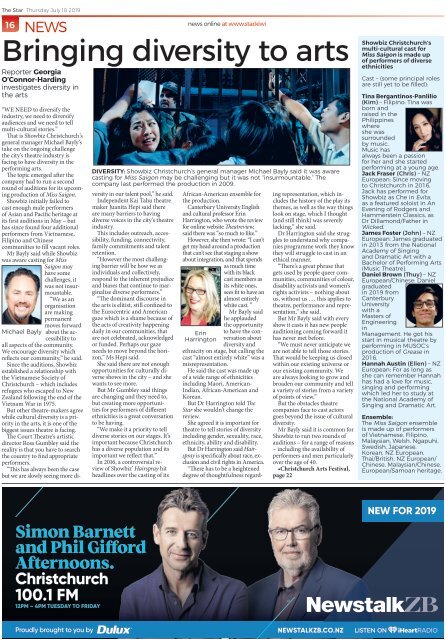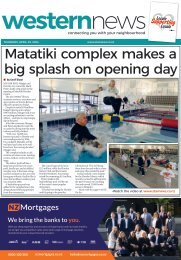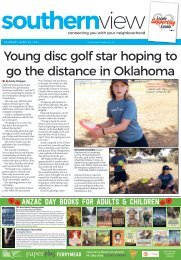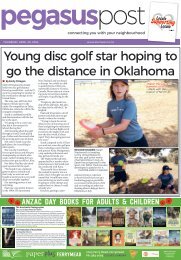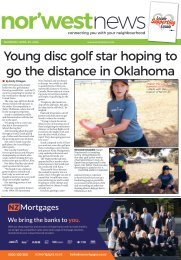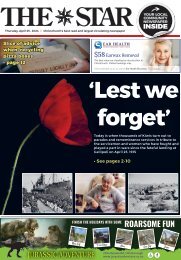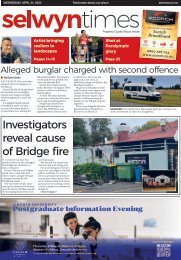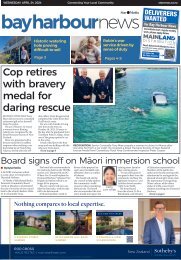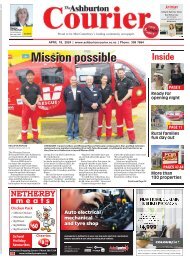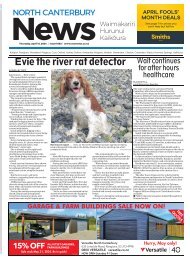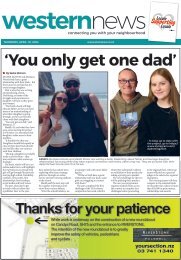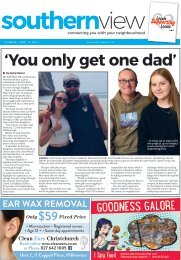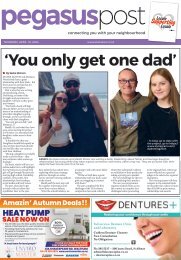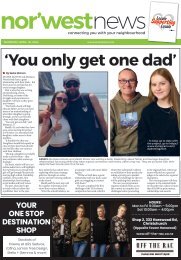The Star: July 18, 2019
You also want an ePaper? Increase the reach of your titles
YUMPU automatically turns print PDFs into web optimized ePapers that Google loves.
<strong>The</strong> <strong>Star</strong> Thursday <strong>July</strong> <strong>18</strong> <strong>2019</strong><br />
16<br />
NEWS<br />
news online at www.star.kiwi<br />
Bringing diversity to arts<br />
Reporter Georgia<br />
O’Connor-Harding<br />
investigates diversity in<br />
the arts<br />
“WE NEED to diversify the<br />
industry, we need to diversify<br />
audiences and we need to tell<br />
multi-cultural stories.”<br />
That is Showbiz Christchurch’s<br />
general manager Michael Bayly’s<br />
take on the ongoing challenge<br />
the city’s theatre industry is<br />
facing to have diversity in the<br />
performing arts.<br />
<strong>The</strong> topic emerged after the<br />
company had to run a second<br />
round of auditions for its upcoming<br />
production of Miss Saigon.<br />
Showbiz initially failed to<br />
cast enough male performers<br />
of Asian and Pacific heritage at<br />
its first auditions in May – but<br />
has since found four additional<br />
performers from Vietnamese,<br />
Filipino and Chinese<br />
communities to fill vacant roles.<br />
Mr Bayly said while Showbiz<br />
was aware casting for Miss<br />
Saigon may<br />
have some<br />
challenges, it<br />
was not insurmountable.<br />
“We as an<br />
organisation<br />
are making<br />
permanent<br />
Michael Bayly<br />
moves forward<br />
about the accessibility<br />
to<br />
DIVERSITY: Showbiz Christchurch’s general manager Michael Bayly said it was aware<br />
casting for Miss Saigon may be challenging but it was not “insurmountable.” <strong>The</strong><br />
company last performed the production in 2009.<br />
all aspects of the community.<br />
We encourage diversity which<br />
reflects our community,” he said.<br />
Since the auditions, Showbiz<br />
established a relationship with<br />
the Vietnamese Society of<br />
Christchurch – which includes<br />
refugees who escaped to New<br />
Zealand following the end of the<br />
Vietnam War in 1975.<br />
But other theatre-makers agree<br />
while cultural diversity is a priority<br />
in the arts, it is one of the<br />
biggest issues theatre is facing.<br />
<strong>The</strong> Court <strong>The</strong>atre’s artistic<br />
director Ross Gumbley said the<br />
reality is that you have to search<br />
the country to find appropriate<br />
performers.<br />
“This has always been the case<br />
but we are slowly seeing more diversity<br />
in our talent pool,” he said.<br />
Independent Kai Tahu theatre<br />
maker Juanita Hepi said there<br />
are many barriers to having<br />
diverse voices in the city’s theatre<br />
industry.<br />
This includes outreach, accessibility,<br />
funding, connectivity,<br />
family commitments and talent<br />
retention.<br />
“However the most challenging<br />
barrier will be how we as<br />
individuals and collectively,<br />
respond to the inherent prejudice<br />
and biases that continue to marginalise<br />
diverse performers.”<br />
“<strong>The</strong> dominant discourse in<br />
the arts is elitist, still confined to<br />
the Eurocentric and American<br />
gaze which is a shame because of<br />
the acts of creativity happening<br />
daily in our communities, that<br />
are not celebrated, acknowledged<br />
or funded. Perhaps our gaze<br />
needs to move beyond the horizon,”<br />
Ms Hepi said.<br />
She said there are not enough<br />
opportunities for culturally diverse<br />
shows in the city – and she<br />
wants to see more.<br />
But Mr Gumbley said things<br />
are changing and they need to,<br />
but creating more opportunities<br />
for performers of different<br />
ethnicities is a great conversation<br />
to be having.<br />
“We make it a priority to tell<br />
diverse stories on our stages. It’s<br />
important because Christchurch<br />
has a diverse population and its<br />
important we reflect that.”<br />
In 2016, a controversial review<br />
of Showbiz’ Hairspray hit<br />
headlines over the casting of its<br />
African-American ensemble for<br />
the production.<br />
Canterbury University English<br />
and cultural professor Erin<br />
Harrington, who wrote the review<br />
for online website <strong>The</strong>atreview,<br />
said there was “so much to like.”<br />
However, she then wrote: “I can’t<br />
get my head around a production<br />
that can’t see that staging a show<br />
about integration, and that spends<br />
as much time<br />
with its black<br />
cast members as<br />
its white ones,<br />
sees fit to have an<br />
almost entirely<br />
white cast. ’’<br />
Mr Bayly said<br />
he applauded<br />
Erin<br />
Harrington<br />
the opportunity<br />
to have the conversation<br />
about<br />
diversity and<br />
ethnicity on stage, but calling the<br />
cast “almost entirely white” was a<br />
misrepresentation.<br />
He said the cast was made up<br />
of a wide range of ethnicities<br />
including Maori, American-<br />
Indian, African-American and<br />
Korean.<br />
But Dr Harrington told <strong>The</strong><br />
<strong>Star</strong> she wouldn’t change the<br />
review.<br />
She agreed it is important for<br />
theatre to tell stories of diversity<br />
including gender, sexuality, race,<br />
ethnicity, ability and disability.<br />
But Dr Harrington said Hairspray<br />
is specifically about race, exclusion<br />
and civil rights in America.<br />
“<strong>The</strong>re has to be a heightened<br />
degree of thoughtfulness regarding<br />
representation, which includes<br />
the history of the play its<br />
themes, as well as the way things<br />
look on stage, which I thought<br />
(and still think) was severely<br />
lacking,” she said.<br />
Dr Harrington said she struggles<br />
to understand why companies<br />
programme work they know<br />
they will struggle to cast in an<br />
ethical manner.<br />
“<strong>The</strong>re’s a great phrase that<br />
gets used by people queer communities,<br />
communities of colour,<br />
disability activists and women’s<br />
rights activists – nothing about<br />
us, without us . . . this applies to<br />
theatre, performance and representation,”<br />
she said.<br />
But Mr Bayly said with every<br />
show it casts it has new people<br />
auditioning coming forward it<br />
has never met before.<br />
“We must never anticipate we<br />
are not able to tell those stories.<br />
That would be keeping us closed<br />
within our existing universe or<br />
our existing community. We<br />
are always looking to grow and<br />
broaden our community and tell<br />
a variety of stories from a variety<br />
of points of view.”<br />
But the obstacles theatre<br />
companies face to cast actors<br />
goes beyond the issue of cultural<br />
diversity.<br />
Mr Bayly said it is common for<br />
Showbiz to run two rounds of<br />
auditions – for a range of reasons<br />
– including the availability of<br />
performers and men particularly<br />
over the age of 40.<br />
•Christchurch Arts Festival,<br />
page 22<br />
Showbiz Christchurch’s<br />
multi-cultural cast for<br />
Miss Saigon is made up<br />
of performers of diverse<br />
ethnicities<br />
Cast – (some principal roles<br />
are still yet to be filled):<br />
Tina Bergantinos-Panlilio<br />
(Kim) – Filipino: Tina was<br />
born and<br />
raised in the<br />
Philippines<br />
where<br />
she was<br />
surrounded<br />
by music.<br />
Music has<br />
always been a passion<br />
for her and she started<br />
performing at a young age.<br />
Jack Fraser (Chris) – NZ<br />
European: Since moving<br />
to Christchurch in 2016,<br />
Jack has performed for<br />
Showbiz as Che in Evita,<br />
as a featured soloist in An<br />
Evening of Rodgers and<br />
Hammerstein Classics, as<br />
Dr Dillamond/Father in<br />
Wicked.<br />
James Foster (John) – NZ<br />
European: James graduated<br />
in 2013 from the National<br />
Academy of Singing<br />
and Dramatic Art with a<br />
Bachelor of Performing Arts<br />
(Music <strong>The</strong>atre).<br />
Daniel Brown (Thuy) – NZ<br />
European/Chinese: Daniel<br />
graduated<br />
in <strong>2019</strong> from<br />
Canterbury<br />
University<br />
with a<br />
Masters of<br />
Engineering<br />
in<br />
Management. He got his<br />
start in musical theatre by<br />
performing in MUSOC’s<br />
production of Grease in<br />
2016.<br />
Hannah Austin (Ellen) – NZ<br />
European: For as long as<br />
she can remember Hannah<br />
has had a love for music,<br />
singing and performing<br />
which led her to study at<br />
the National Academy of<br />
Singing and Dramatic Art.<br />
Ensemble:<br />
<strong>The</strong> Miss Saigon ensemble<br />
is made up of performers<br />
of Vietnamese, Filipino,<br />
Malaysian, Welsh, Ngapuhi,<br />
Swedish, Japanese,<br />
Korean, NZ European,<br />
Thai/British, NZ European/<br />
Chinese, Malaysian/Chinese,<br />
European/Samoan heritage.<br />
Simon Barnett<br />
and Phil Gifford<br />
Afternoons.<br />
Christchurch<br />
100.1 FM<br />
12PM – 4PM TUESDAY TO FRIDAY<br />
NEW FOR <strong>2019</strong><br />
Proudly brought to you by<br />
NEWSTALKZB.CO.NZ


